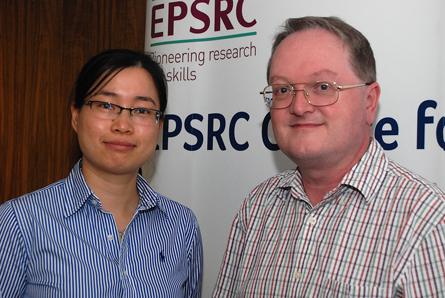New ‘smart database’ aids industry with the 100s of ISO standards

Fri, 04 Sep 2015 14:20:00 BST
The ‘category theory’ database is three times faster than conventional relational databases and takes up a third of the storage space

◄ Dr Qunfen Qi and Professor Paul Scott
A HUGE expansion in the quantity and complexity of international standards is an increasingly serious issue in fields such as advanced engineering. Now, a research project headed by a University of Huddersfield professor is developing software that will lead to massively increased efficiency by ensuring that designers and manufacturers can easily comply with the voluminous guidelines laid down by the International Standards Organisation (ISO).
Already one major international company has been supplied with a version of the package, which is in the form of a smart database that can be harnessed by designers as they work on technical specifications and measurements. The product is claimed to be three times faster than conventional relational databases and takes up a third of the storage space.
Professor Paul Scott – a mathematician and metrologist – holds a prestigious Fellowship in Manufacturing from the Engineering and Physical Sciences Research Council (EPSRC). One of the projects that he is undertaking during the Fellowship is the development of the smart database, which owes its efficiency to the fact that Professor Scott chose to use category theory as its foundation. This, he says, makes it more efficient than relational databases – such as Microsoft’s Access – that are based on set theory.
Flexibility to embrace different types of data
 Increased flexibility is also a key feature, because the smart database under development at the University of Huddersfield is capable of embracing many different types of data. For example, Dr Qunfen Qi – a researcher working with Professor Scott – has populated it with data relating to ISO standards for surface texture. The resultant product is named CATSurf, including a module that was developed specifically for Rolls Royce.
Increased flexibility is also a key feature, because the smart database under development at the University of Huddersfield is capable of embracing many different types of data. For example, Dr Qunfen Qi – a researcher working with Professor Scott – has populated it with data relating to ISO standards for surface texture. The resultant product is named CATSurf, including a module that was developed specifically for Rolls Royce.
Dr Qi, who has given several conference presentations on the science behind the database, said that ISO standards were becoming more and more complex. For example, designers working on the surface texture of a product – a single item in its GPS (Geometrical Product Specifications) – must comply with over 30 ISO standards, the equivalent of thousands of pages of documents.
“And there are hundreds of standards! This is a huge amount of work for people involved in design and metrology,” said Dr Qi. However, designers who use CATSurf – and subsequent smart databases that will be populated with the other GPS categories – can easily conform to ISO standards as they work, ensuring for example that there are no ambiguities or omissions in their design and subsequent measurements. This leads to major efficiency gains and cost savings.
Best methodology to employ
Professor Scott has a long-standing involvement with the International Standards Organisation. He is a board member of its TC213 Technical Committee, which covers dimensional and geometrical product specifications and verification. It was realised as long as 15 years ago, he said, that ISO standards in this field would eventually reach such levels of complexity that no single person could assimilate them all. That point has now arrived.
“Even the people on the standards committee are struggling, so somebody running a small engineering company doesn’t stand a chance!” said Professor Scott.
He responded to the issue by supervising a sequence of doctoral research projects, which began with an investigation of the best methodology to employ. It was decided that a smart database using category theory was the way to go.
Subsequent research projects have improved the efficiency of the database and began to populate it with GPS standards. A working system has therefore been produced and various commercial options for its future are under consideration.







